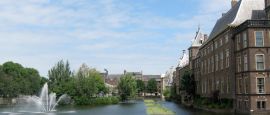The Hague History
The Hague is a hybrid city: it’s The Netherlands’ seat of government but not its capital city; it has many of the trappings of power but without any of its vim.
It is a state of affairs that has continued throughout its history, starting with its founding by 1230 when Count Floris IV of Holland built a hunting lodge there.
Soon the city grew, with the rulers of Holland using The Hague as an administrative and financial centre. As a result, the city enjoyed a building boom with the Ridderzaal (Knight's Hall), which still stands at Binnenhof, is one of the original seats of government.
Its growth didn’t go without a hitch, however, with centuries of economic boom arrested by the Eighty Years War. During this time, in 1575, it was briefly threatened with demolition thanks to its lack of city walls.
Ironically, salvation came courtesy of another set of wars, the Napoleonic, with The Hague finally granted a city charter in 1806 by the French dictator himself.
With the formation of the United Kingdom of the Netherlands at the end of the Napoleonic Wars, it became the seat of government while the capital alternated between Brussels and Amsterdam.
After Belgium broke away in 1830, The Hague began to boom and became a hub for the Dutch Empire, with many civil servants posted overseas returning to the city to retire. One of the wealthiest cities in the Netherlands by the turn of the 20th century, its development was curtailed by the outbreak of WWI and almost derailed completely by the depredations of Hitler and the Nazis.
By the end of the war, much of The Hague was badly damaged and, as a result, the city became the biggest building site in Europe in the 1950s.
Redevelopment continued apace in the 1960s and 70s, with the city expanding and absorbing many of the surrounding towns. Today, it remains what it has always been: a bureaucrats’ city that isn’t nearly as grey as its reputation suggests.
Did you know?
• Christiaan Huygens, inventor of the pendulum clock and pocket watch, was born in The Hague in 1629.
• In 1945, England accidentally bombarded the Bezuidenhout district of The Hague. The intended target was another district, from which German missiles were being launched.
• The city was first mentioned as the name Haga in a 1242 charter.
Do you have any Feedback about this page?
© 2026 Columbus Travel Media Ltd. All rights reserved. No part of this site may be reproduced without our written permission, click here for information on Columbus Content Solutions.




 You know where
You know where